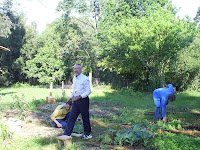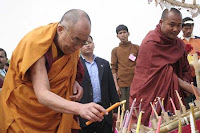"Se tivermos a felicidade de tomar por referencia a natureza que nao nasce e nao morre, poderemos entrar alegremente no mundo dos referenciais, no mundo das coisas que nascem e morrem, porque saberemos onde estamos e o que somos. Estaremos livres desse movimento."
Lama Padma Samten
www.caminhodomeio.org
 "Não há diferenças em conteúdo ou essência, apenas na forma.
"Não há diferenças em conteúdo ou essência, apenas na forma.O foco do CEBB é a inserção desse conteúdo elevado de compreensão e visão nas atividades e opções da vida cotidiana."
Lama Padma Samten
www.cebbsp.org
"Olhe para a pessoa que lhe causa aborrecimento e tire proveito da oportunidade para controlar a própria ira e desenvolver a compaixão..JPG) Entretanto, se o aborrecimento for muito grande ou se você achar a pessoa tão desagradável que seja impossível agüentá-la, talvez seja melhor sair correndo!"
Entretanto, se o aborrecimento for muito grande ou se você achar a pessoa tão desagradável que seja impossível agüentá-la, talvez seja melhor sair correndo!"
S.S. o Dalai Lama
foto Gui von Schmidt
.JPG) Entretanto, se o aborrecimento for muito grande ou se você achar a pessoa tão desagradável que seja impossível agüentá-la, talvez seja melhor sair correndo!"
Entretanto, se o aborrecimento for muito grande ou se você achar a pessoa tão desagradável que seja impossível agüentá-la, talvez seja melhor sair correndo!"S.S. o Dalai Lama
foto Gui von Schmidt

Ensinamentos belíssimos do Lama Samten, S.E. Chagdud Rinpoche e S.S. o Dalai Lama:
Bodistava.org
Lama Padma Samten
S.E. Chagdud Tulku Rinpoche
S.S. o Dalai Lama
Congressional Gold Medal Ceremony in Washington DC

Video1: Elie Wiesel's Address
Video2: President Bush's Address and Award Presentation
Video3-5: H.H. the Dalai Lama's Address
Video6: Closing Benediction
at www.media.phayul.com

Video1: Elie Wiesel's Address
Video2: President Bush's Address and Award Presentation
Video3-5: H.H. the Dalai Lama's Address
Video6: Closing Benediction
at www.media.phayul.com
 U.S. award opportunity for China: Dalai Lama envoy
U.S. award opportunity for China: Dalai Lama envoy China should view the Dalai Lama's high-profile visit to Washington next week as a chance to listen to the exiled Buddhist spiritual leader who Beijing shuns as a Tibetan separatist, his envoy
The power of peace and persistence
Most disturbing is Beijing's unwillingness to engage the Dalai Lama directly on the Tibetan issue. It is time for Beijing to realize that inviting the Dalai Lama to China not only is the right thing to do, it is also the wisest
Life and times of Dalai Lama
Tibetan Buddhism recognizes the Dalai Lama — which means "Ocean of Wisdom" — as the spiritual and political leader of Tibet. The office dates back to the 15th century. He is a Nobel Peace Prize winner, is respected
Text and photo - www.phayul.com
 "A fonte de todos os fenômenos do samsara e do nirvana
"A fonte de todos os fenômenos do samsara e do nirvanaÉ a natureza da mente, vazia, luminosa,
Toda-includente, vasta como o céu.
Quando no estado de vastidão semelhante ao céu,
Relaxe em sua abertura; permaneça naquela própria abertura,
Misture-se àquele estado semelhante ao céu:
Naturalmente, ele irá se tornar mais e mais relaxado.
Excelente!
Se você desenvolver a habilidade
Neste método de integrar mente e visão,
Sua realização virá a ser naturalmente vasta.
E, assim como o sol brilha livremente através do espaço,
Sua compaixão não poderá deixar de brilhar sobre todos os seres não-realizados."
S.S. Dilgo Khyentse Rinpoche
Veja trecho sobre a vida de S.S. Dilgo K. Rinpoche ( video )
Texto e foto www.shechenbrasil.com
 "Renunciation doesn't mean changing the color of our skin, putting on robes or wearing make-up. Everybody, each human being, needs renunciation. Does that mean giving something up? Yes, it does--we all have to give up something--but what it is that we have to abandon is an individual decision; each of us has to check up for ourselves what extreme thoughts come into our mind and once we have determined what they are we should deal with them in an easy-going way. That's the way to renounce...deal with extreme emotions in an easy-going way."
"Renunciation doesn't mean changing the color of our skin, putting on robes or wearing make-up. Everybody, each human being, needs renunciation. Does that mean giving something up? Yes, it does--we all have to give up something--but what it is that we have to abandon is an individual decision; each of us has to check up for ourselves what extreme thoughts come into our mind and once we have determined what they are we should deal with them in an easy-going way. That's the way to renounce...deal with extreme emotions in an easy-going way."Lama Yeshe
Livro "Becoming Your Own Therapist" - download
 "Uh oh! Não durmas agora, ser afortunado.
"Uh oh! Não durmas agora, ser afortunado.Desperta com diligência.
De tempos sem princípio até agora tens dormido em ignorância.
Agora é o momento de deixar o sono para trás e praticar virtude,
com corpo, fala e mente(...)" continua >
As exatas palavras de Chagdud Tulku Rinpoche ao alto-falante numa manhã no Khadro Ling em Três Coroas.
The exact words of Chagdud Tulku Rinpoche played over the loud speaker early one morning at Khandro Ling in Brazil.
Foto e texto - www.bodisatva.org
 Ensinamentos do Lama Padma Samten em áudio e vídeo:
Ensinamentos do Lama Padma Samten em áudio e vídeo:.A ciência e a mente
.O Sutra do Diamante
.Cultura de paz e responsabilidade universal
 The Purpose of Life - VIDEO
The Purpose of Life - VIDEO "Why working with the mind is the only way to find true happiness."
Sogyal Rinpoche
www.rigpa.org
"Superficial observation of the sense world might lead you to believe that people’s problems are different,  but if you check more deeply, you will see that fundamentally, they are the same. What makes people’s problems appear unique is their different interpretation of their experiences."
but if you check more deeply, you will see that fundamentally, they are the same. What makes people’s problems appear unique is their different interpretation of their experiences."
Lama Thubten Yeshe
www.fpmt.org
foto Marcio Prado
 but if you check more deeply, you will see that fundamentally, they are the same. What makes people’s problems appear unique is their different interpretation of their experiences."
but if you check more deeply, you will see that fundamentally, they are the same. What makes people’s problems appear unique is their different interpretation of their experiences."Lama Thubten Yeshe
www.fpmt.org
foto Marcio Prado

“We crave peaceful solutions to world issues, and violence and war are no longer the initial responses to a conflict”
S.S. o Dalai Lama
Texto e foto www.phayul.com
"Nossa vida deve ser integrada ao conhecimento Dzogchen. É por isso que este conhecimento deve se tornar cada vez mais concreto. Sabemos qual é o sentido real do ensinamento: não se trata somente de estudar alguns livros ou de fazer algumas análises, porém de compreender que nossa vida está relacionada à nossa condição. No ensinamento se diz que antes de tudo precisamos descobrir a nossa verdadeira natureza e permanecer neste estado, mas se quisermos descobrir a nossa natureza, teremos de descobrir qual é a nossa condição; isso significa entender que estamos vivendo em sociedade dentro da visão dualista, em função do que surgem muitos problemas. Ainda que não criássemos esses problemas, eles se manifestariam por causa das circunstâncias. O que fazer então, nesses casos?
Depende muito do nosso conhecimento.
Se formos bons praticantes Dzogchen, então saberemos como integrar tudo em sua dimensão real, mas cada praticante deveria se examinar um pouco. Não é suficiente somente pensar: “Sou um velho estudante, faz anos que sigo o ensinamento Dzogchen”. Alguns pensam: “Conheço o Dzogchen Semde, Longde, Upadesha, fiz muitos retiros, recebi muitos ensinamentos”. O conhecimento não deve servir para criar uma espécie de vocabulário. O importante é que se torne algo concreto. Pensemos em como passamos um só dia: nós o passamos entre emoções, confusões e dominados pela visão dualista, ou passamos o tempo com consciência? Se formos praticantes Dzogchen, deveremos passar o tempo com consciência. Consciência significa saber qual é nossa verdadeira condição e, também, (qual é) nossa condição relativa."
Chögyal Namkhai Norbu
Texto completo: www.dzogchen.com.br
Depende muito do nosso conhecimento.
Se formos bons praticantes Dzogchen, então saberemos como integrar tudo em sua dimensão real, mas cada praticante deveria se examinar um pouco. Não é suficiente somente pensar: “Sou um velho estudante, faz anos que sigo o ensinamento Dzogchen”. Alguns pensam: “Conheço o Dzogchen Semde, Longde, Upadesha, fiz muitos retiros, recebi muitos ensinamentos”. O conhecimento não deve servir para criar uma espécie de vocabulário. O importante é que se torne algo concreto. Pensemos em como passamos um só dia: nós o passamos entre emoções, confusões e dominados pela visão dualista, ou passamos o tempo com consciência? Se formos praticantes Dzogchen, deveremos passar o tempo com consciência. Consciência significa saber qual é nossa verdadeira condição e, também, (qual é) nossa condição relativa."
Chögyal Namkhai Norbu
Texto completo: www.dzogchen.com.br
 "Whatever problem one experiences if one thinks about the benefits of problems and how they are beneficial for ones own life, to develop ones mind in compassion, to develop loving kindness, patience, wisdom, and all the positive qualities for the path to liberation. By thinking of the benefits one develops this precious quality, this most healthy positive way of thinking that brings happiness and that stops you from harming yourself and stops you from harming others."
"Whatever problem one experiences if one thinks about the benefits of problems and how they are beneficial for ones own life, to develop ones mind in compassion, to develop loving kindness, patience, wisdom, and all the positive qualities for the path to liberation. By thinking of the benefits one develops this precious quality, this most healthy positive way of thinking that brings happiness and that stops you from harming yourself and stops you from harming others."Lama Zopa Rinpoche - www.fpmt.org
Marcadores:
compassion,
cultura de paz,
culture of peace,
English,
Lama Zopa Rinpoche,
liberation,
problem,
wisdom
"Karma is your experiences of body and mind. The word itself is Sanskrit; it means  cause and effect. Your experiences of mental and physical happiness are the effects of certain causes, but those effects themselves become the cause of future results. One action produces a reaction; that is karma."
cause and effect. Your experiences of mental and physical happiness are the effects of certain causes, but those effects themselves become the cause of future results. One action produces a reaction; that is karma."
Lama Thubten Yeshe - www.lamayeshe.com
 cause and effect. Your experiences of mental and physical happiness are the effects of certain causes, but those effects themselves become the cause of future results. One action produces a reaction; that is karma."
cause and effect. Your experiences of mental and physical happiness are the effects of certain causes, but those effects themselves become the cause of future results. One action produces a reaction; that is karma."Lama Thubten Yeshe - www.lamayeshe.com
"Would you like to participate in an experiment in meditation? First, look to your posture: arrange the legs in the most comfortable position; set the backbone straight as an arrow. Place your hands in the position of meditative equipoise, four finger widths below your navel, with the left hand on the bottom, right hand on top, and your thumbs touching to form a triangle. This placement of the hands has connection with the place inside the body where inner heat is generated. Bending the neck down slightly, allow the mouth and teeth to be as usual, with the top of the tongue touching the roof of the mouth near the top teeth. Let the eyes gaze downwards loosely -- it is not necessary that they be directed to the end of the nose; they can be pointed toward the floor in front of you if that seems more natural(...)" > http://www.ltwa.net/index.htm#
S.S. o Dalai Lama
S.S. o Dalai Lama
 "(...)
"(...)O resultado para o Tibet foi o seu fim, pelo menos temporário, como país. Ocorre que o tempo para o Dalai Lama tem um significado budista, não é importante o que sucede agora, ele pode esperar que sua doutrina se espalhe pelo planeta e dê seus frutos. Aparentemente é um ingênuo, na realidade é um estrategista de longo prazo.
(...) Os que clamam pela destruição do inimigo devem compreender que toda a força e ódio restará armazenada, ressurgindo periodicamente e assombrando os vencedores. Este o dilema, você pode escolher, reagir as agressões, ou quando alguém destruir suas propriedades, ou matar seus parentes, optar por apenas pregar a compaixão e perdoa-lo sem reagir, pensando no longo prazo como o Dalai Lama. Antes de pregar em público, examine sua opção pessoal.
No Dharma,
Genshô "
www.montanhadourada.org
Marcadores:
compaixão,
cultura de paz,
culture of peace,
Genshô,
português,
S.S. o Dalai Lama,
Tibet
 Imperdivel!!
Imperdivel!!Mingyur Rinpoche no Brasil - junho proximo em Sp.
http://yongeybr.tripod.com/
Grande abraco
"Faith alone never stops problems; understanding knowledge-wisdom  always does. Lord Buddha himself said that belief in Buddha was dangerous; that instead of just believing in something, people should use their minds to try to discover their own true nature".
always does. Lord Buddha himself said that belief in Buddha was dangerous; that instead of just believing in something, people should use their minds to try to discover their own true nature".
Lama Zopa Rinpoche
www.fpmt.org
 always does. Lord Buddha himself said that belief in Buddha was dangerous; that instead of just believing in something, people should use their minds to try to discover their own true nature".
always does. Lord Buddha himself said that belief in Buddha was dangerous; that instead of just believing in something, people should use their minds to try to discover their own true nature". Lama Zopa Rinpoche
www.fpmt.org
 “O que é buda? A natureza completa liberta dos hábitos, dos condicionamentos grosseiros e sutis...
“O que é buda? A natureza completa liberta dos hábitos, dos condicionamentos grosseiros e sutis... Buda não é o ser, não é uma pessoa.

Buda é uma condição de liberdade de todos os impulsos”.
Lama Padma Samten
www.caminhodomeio.org
Peace be upon us
Times Of India[Saturday, January 20, 2007 16:08]
Text by Sagari Chhabra and photo Phayul.com
 Last week the Dalai Lama said, “I knew a Tibetan monk for a long time. He was taken away to a Chinese gulag and kept there for 18 years. When he was released he fled to India, along with other Tibetans, for refuge”. He continued calmly, “I met him and asked him about his experiences in prison”. The monk replied, “At times I was in great danger”. “What kind of danger?” asked the Dalai Lama. “I was in danger of losing my compassion towards my Chinese captors”, he replied. “Now, that”, spoke the Dalai Lama, “is Buddhism”.
Last week the Dalai Lama said, “I knew a Tibetan monk for a long time. He was taken away to a Chinese gulag and kept there for 18 years. When he was released he fled to India, along with other Tibetans, for refuge”. He continued calmly, “I met him and asked him about his experiences in prison”. The monk replied, “At times I was in great danger”. “What kind of danger?” asked the Dalai Lama. “I was in danger of losing my compassion towards my Chinese captors”, he replied. “Now, that”, spoke the Dalai Lama, “is Buddhism”.
I am not a believer in organised religion, but spent three days with the Dalai Lama learning first-hand some of the teachings of Buddhism. They are worthy of sharing as we enter the New Year searching for that elusive element — peace. The Dalai Lama talks in simple and child-like ways, interspersed with his own laughter. He chortles as he explains: “I am fed up of formality, I have had too much of it since my childhood”. Indeed as head of Tibet in exile and as the head of the Buddhist religion he has had his share of ceremony. Yet, he also remains a living propagator of an age-old philosophy of non-violence, or as a frail man in loin cloth called it earlier, satyagraha.
How do you deal with an ‘enemy’, someone who actually has inflicted pain upon you, asked someone. If you think the workshop was attended by believers, think again; in rapt attendance were foreign secretary, Shankar Menon, former foreign secretary Shyam Saran, now handling the Indo-US nuclear deal, Nasscom head Kiran Karnik and other movers and shakers of society. “Your enemy”, replied the Dalai Lama to all listening, “becomes an object for you to practise compassion. It is easy to practise compassion on those you love, but the enemy becomes an object for you to further your practice”.
...http://www.phayul.com
Times Of India[Saturday, January 20, 2007 16:08]
Text by Sagari Chhabra and photo Phayul.com
 Last week the Dalai Lama said, “I knew a Tibetan monk for a long time. He was taken away to a Chinese gulag and kept there for 18 years. When he was released he fled to India, along with other Tibetans, for refuge”. He continued calmly, “I met him and asked him about his experiences in prison”. The monk replied, “At times I was in great danger”. “What kind of danger?” asked the Dalai Lama. “I was in danger of losing my compassion towards my Chinese captors”, he replied. “Now, that”, spoke the Dalai Lama, “is Buddhism”.
Last week the Dalai Lama said, “I knew a Tibetan monk for a long time. He was taken away to a Chinese gulag and kept there for 18 years. When he was released he fled to India, along with other Tibetans, for refuge”. He continued calmly, “I met him and asked him about his experiences in prison”. The monk replied, “At times I was in great danger”. “What kind of danger?” asked the Dalai Lama. “I was in danger of losing my compassion towards my Chinese captors”, he replied. “Now, that”, spoke the Dalai Lama, “is Buddhism”.I am not a believer in organised religion, but spent three days with the Dalai Lama learning first-hand some of the teachings of Buddhism. They are worthy of sharing as we enter the New Year searching for that elusive element — peace. The Dalai Lama talks in simple and child-like ways, interspersed with his own laughter. He chortles as he explains: “I am fed up of formality, I have had too much of it since my childhood”. Indeed as head of Tibet in exile and as the head of the Buddhist religion he has had his share of ceremony. Yet, he also remains a living propagator of an age-old philosophy of non-violence, or as a frail man in loin cloth called it earlier, satyagraha.
How do you deal with an ‘enemy’, someone who actually has inflicted pain upon you, asked someone. If you think the workshop was attended by believers, think again; in rapt attendance were foreign secretary, Shankar Menon, former foreign secretary Shyam Saran, now handling the Indo-US nuclear deal, Nasscom head Kiran Karnik and other movers and shakers of society. “Your enemy”, replied the Dalai Lama to all listening, “becomes an object for you to practise compassion. It is easy to practise compassion on those you love, but the enemy becomes an object for you to further your practice”.
...http://www.phayul.com
Assinar:
Postagens (Atom)
